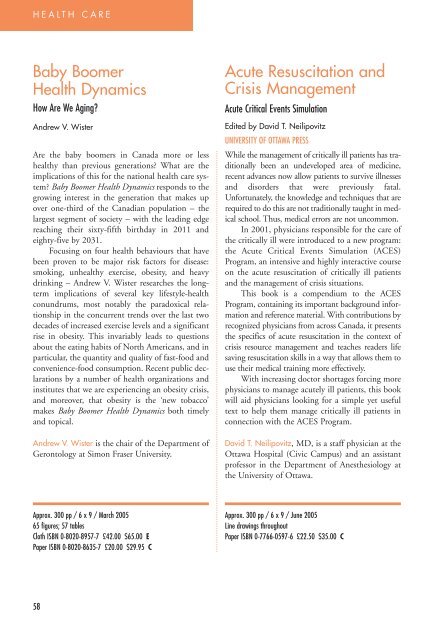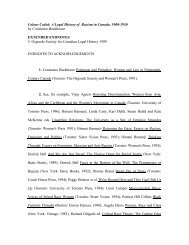Spring/Summer 2005 - University of Toronto Press Publishing
Spring/Summer 2005 - University of Toronto Press Publishing
Spring/Summer 2005 - University of Toronto Press Publishing
You also want an ePaper? Increase the reach of your titles
YUMPU automatically turns print PDFs into web optimized ePapers that Google loves.
HEALTH CAREBaby BoomerHealth DynamicsHow Are We Aging?Andrew V. WisterAre the baby boomers in Canada more or lesshealthy than previous generations? What are theimplications <strong>of</strong> this for the national health care system?Baby Boomer Health Dynamics responds to thegrowing interest in the generation that makes upover one-third <strong>of</strong> the Canadian population – thelargest segment <strong>of</strong> society – with the leading edgereaching their sixty-fifth birthday in 2011 andeighty-five by 2031.Focusing on four health behaviours that havebeen proven to be major risk factors for disease:smoking, unhealthy exercise, obesity, and heavydrinking – Andrew V. Wister researches the longtermimplications <strong>of</strong> several key lifestyle-healthconundrums, most notably the paradoxical relationshipin the concurrent trends over the last twodecades <strong>of</strong> increased exercise levels and a significantrise in obesity. This invariably leads to questionsabout the eating habits <strong>of</strong> North Americans, and inparticular, the quantity and quality <strong>of</strong> fast-food andconvenience-food consumption. Recent public declarationsby a number <strong>of</strong> health organizations andinstitutes that we are experiencing an obesity crisis,and moreover, that obesity is the ‘new tobacco’makes Baby Boomer Health Dynamics both timelyand topical.Andrew V. Wister is the chair <strong>of</strong> the Department <strong>of</strong>Gerontology at Simon Fraser <strong>University</strong>.Acute Resuscitation andCrisis ManagementAcute Critical Events SimulationEdited by David T. NeilipovitzUNIVERSITY OF OTTAWA PRESSWhile the management <strong>of</strong> critically ill patients has traditionallybeen an undeveloped area <strong>of</strong> medicine,recent advances now allow patients to survive illnessesand disorders that were previously fatal.Unfortunately, the knowledge and techniques that arerequired to do this are not traditionally taught in medicalschool. Thus, medical errors are not uncommon.In 2001, physicians responsible for the care <strong>of</strong>the critically ill were introduced to a new program:the Acute Critical Events Simulation (ACES)Program, an intensive and highly interactive courseon the acute resuscitation <strong>of</strong> critically ill patientsand the management <strong>of</strong> crisis situations.This book is a compendium to the ACESProgram, containing its important background informationand reference material. With contributions byrecognized physicians from across Canada, it presentsthe specifics <strong>of</strong> acute resuscitation in the context <strong>of</strong>crisis resource management and teaches readers lifesaving resuscitation skills in a way that allows them touse their medical training more effectively.With increasing doctor shortages forcing morephysicians to manage acutely ill patients, this bookwill aid physicians looking for a simple yet usefultext to help them manage critically ill patients inconnection with the ACES Program.David T. Neilipovitz, MD, is a staff physician at theOttawa Hospital (Civic Campus) and an assistantpr<strong>of</strong>essor in the Department <strong>of</strong> Anesthesiology atthe <strong>University</strong> <strong>of</strong> Ottawa.Approx. 300 pp / 6 x 9 / March <strong>2005</strong>65 figures; 57 tablesCloth ISBN 0-8020-8957-7 £42.00 $65.00 EPaper ISBN 0-8020-8635-7 £20.00 $29.95 CApprox. 300 pp / 6 x 9 / June <strong>2005</strong>Line drawings throughoutPaper ISBN 0-7766-0597-6 £22.50 $35.00 C58
















